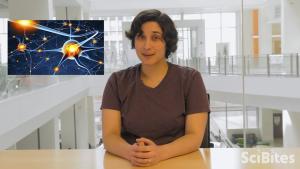How A Film Editor for Your Genes Contributes to Dementia
Tens of thousands of Americans suffer from an illness called frontotemporal dementia (FTD), which slowly destroys the brain. There is no effective treatment for FTD and creating therapies for it is difficult because the disease’s underlying cause can differ between patients. Sahba Seddighi, a graduate student in the Intramural Research Program at the National Institutes of Health, is helping to solve that problem by developing ways for researchers to figure out the specific drivers of the disease in individual patients. Her work has the potential to revolutionize the way scientists test treatments for FTD and other brain diseases like Alzheimer’s and ALS.
Click here to learn more about the research being done in Sahba’s lab.
Interested in finding out for yourself what it’s like to do research at NIH? Check out our training opportunities to learn about the IRP’s programs for students, recent graduates, and postdoctoral fellows.
Still hungry for more SciBites? Watch more.
Categories:
Graduate students Neuroscience ALS Alzheimer’s disease Women in science
Related Videos
This page was last updated on Monday, August 7, 2023




